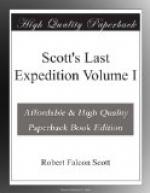There is nothing intrinsically new in this observation; it has often been noticed that metal surfaces at low temperatures give a sensation of burning to the bare touch, but none the less it is an interesting variant of the common fact.
Apropos. Atkinson is suffering a good deal from his hand: the frostbite was deeper than I thought; fortunately he can now feel all his fingers, though it was twenty-four hours before sensation returned to one of them.
Monday, July 10.—We have had the worst gale I have ever known in these regions and have not yet done with it.
The wind started at about mid-day on Friday, and increasing in violence reached an average of 60 miles for one hour on Saturday, the gusts at this time exceeding 70 m.p.h. This force of wind, although exceptional, has not been without parallel earlier in the year, but the extraordinary feature of this gale was the long continuance of a very cold temperature. On Friday night the thermometer registered -39 deg.. Throughout Saturday and the greater part of Sunday it did not rise above -35 deg.. Late yesterday it was in the minus twenties, and to-day at length it has risen to zero.
Needless to say no one has been far from the hut. It was my turn for duty on Saturday night, and on the occasions when I had to step out of doors I was struck with the impossibility of enduring such conditions for any length of time. One seemed to be robbed of breath as they burst on one—the fine snow beat in behind the wind guard, and ten paces against the wind were sufficient to reduce one’s face to the verge of frostbite. To clear the anemometer vane it is necessary to go to the other end of the hut and climb a ladder. Twice whilst engaged in this task I had literally to lean against the wind with head bent and face averted and so stagger crab-like on my course. In those two days of really terrible weather our thoughts often turned to absentees at Cape Crozier with the devout hope that they may be safely housed.
They are certain to have been caught by this gale, but I trust before it reached them they had managed to get up some sort of shelter. Sometimes I have imagined them getting much more wind than we do, yet at others it seems difficult to believe that the Emperor penguins have chosen an excessively wind-swept area for their rookery.
To-day with the temperature at zero one can walk about outside without inconvenience in spite of a 50-mile wind. Although I am loath to believe it there must be some measure of acclimatisation, for it is certain we should have felt to-day’s wind severely when we first arrived in McMurdo Sound.
Tuesday, July 11.—Never was such persistent bad weather. To-day the temperature is up to 5 deg. to 7 deg., the wind 40 to 50 m.p.h., the air thick with snow, and the moon a vague blue. This is the fourth day of gale; if one reflects on the quantity of transported air (nearly 4,000 miles) one gets a conception of the transference which such a gale effects and must conclude that potentially warm upper currents are pouring into our polar area from more temperate sources.




